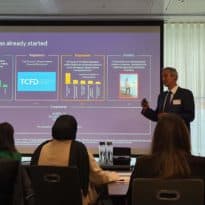ESG has become a hot topic for investors in recent years. This is becoming even more so as the coronavirus pandemic forces us to rethink our priorities when pursuing economic growth, says Samantha Lamb, head of ESG – Fixed Income at Aberdeen Standard Investments.
When we consider ESG, ‘E’ is often front of mind for people as climate change has rapidly made its way to the top of the agenda. For fixed income, the green bond market is an example of where investors turn their attention to when considering climate and environmental projects. It gets a lot of attention because it has grown quickly over recent years, yet it’s a relatively small part of fixed income. Green bonds only make up 5% of the euro market and the issuance in the UK is heavily dominated by utilities, banks and real estate, which can give a skewed perception of the market.
A common misconception amongst investors is that a bond doesn’t actually need to be a green bond to make a good candidate for a climate transition bond fund. From an investment perspective, green bonds are a useful tool but you still have to carry out the more detailed research to understand the company and the details of those green bonds and covenants. As asset managers, we are looking at how we can support a broader number of industries and companies that are working on solving the problems of climate change. There are also companies that are less interested in issuing green bonds if it doesn’t fit with their business or profile, however, they are still actively involved in activities that support climate and environmental projects.
Yet, as we examine the bigger picture of ESG, the environmental aspect is only one consideration for investors. As we navigate our way through the current crisis, we are finding many interesting questions arising from the social and governance points of the triad.
While environmental issues have increasing potential to impact valuations, from a fixed income perspective, if we look at what impacts them most, it is governance. Poor corporate governance increases the risk of scandals, which can have material financial consequences for the company, often leading to rapid deterioration in bond prices when they are uncovered. Understanding the incentives of those controlling the company is vital, as well as getting comfortable with how decision-making power is distributed among owners and managers. Like social and environmental risks, this requires transparency and good disclosure from the company.
The pandemic has also posed questions around social, which often lags behind its two counterparts. We are currently thinking about how companies are managing their employees. In particular, and certainly more for smaller businesses, we’ve seen criticism of the treatment of employees and that there’s a real push back from investors against this type of behavior. Additionally, in 2015 the Modern Slavery Act was introduced, however, we haven’t necessarily witnessed litigation and the consequences for companies yet. This will just be a matter of time.
It’s also important to examine whether business fundamentals have shifted due to the effects of the pandemic and whether this will change or accelerate some of the ESG trends.
For example, some e-commerce businesses that have strong balance sheets have been vocal about supporting their supply chains, such as offering prompt payments to the smaller businesses within this. It’s never sensible to squeeze your supply chain too much because you want these companies to survive. Yet, this type of action or management of stakeholders isn’t necessarily available to all. Take airlines as another example. They are currently in a fight for survival. It’s a much more complex landscape for them and a lot of crucial business decisions will be being made. It is a fine balance for businesses battling the crisis at the moment, in terms of maintaining survival whilst not compromising on their ESG principles.
Investors everywhere also have an important role to play in helping industries and businesses find answers. We can help direct investments towards companies that we know are working on sustainable solutions, or have the all-important conversations with companies to ensure they are on the right track as we navigate this challenging time.



































